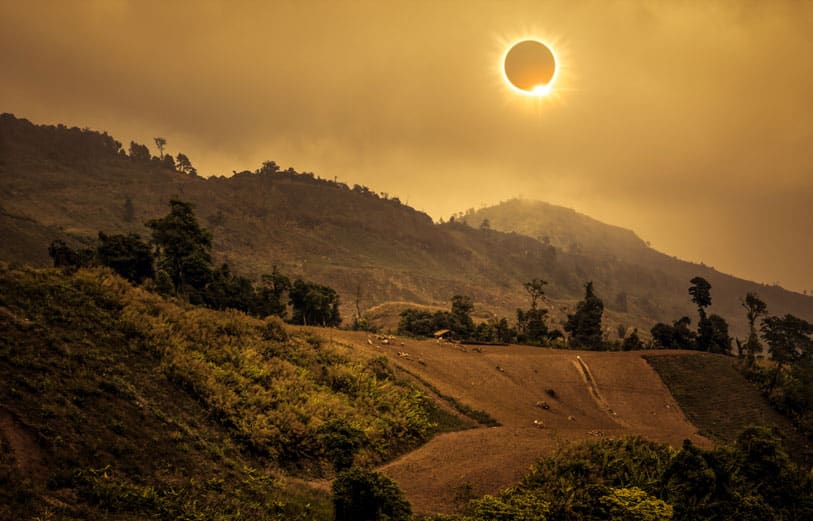The Next Solar Eclipse: How to Watch This Event Safely

Know how to enjoy this phenomenon without risking your eyesight.
What is a solar eclipse, and when does the next one occur?
A solar eclipse happens when the Moon passes between the Sun and the Earth. When this occurs, the moon blocks (eclipses) the Sun's light and casts a shadow on certain parts of the Earth. The next solar eclipse will occur over parts of the Midwest (including Illinois) on April 8, 2024.
The importance of safety in viewing a solar eclipse.
For many, witnessing a solar eclipse is a breathtaking experience. However, it's essential to prioritize safety while viewing this cosmic event.
Fortunately, there are a variety of options to help you observe this 100-year phenomenon as safely as possible. In this article, we'll consider the potential hazards of viewing a solar eclipse and offer tips to protect your vision.
Why is staring at the sun during an eclipse hazardous?
- Intense Solar Radiation: The sun emits harmful ultraviolet (UV) and infrared (IR) radiation, which can damage the delicate cells in your eyes' retinas.
- Prolonged Exposure: During an eclipse, the moon only partially covers the sun at certain times. Staring at the sun for an extended period, even during an eclipse, can result in potentially irreversible eye injury.
- No Pain Warning: The retina lacks pain receptors, so you won't feel immediate discomfort when damage occurs. This means you may not realize the harm to your eyes until it's too late.
What can we do to watch a solar eclipse safely?
Protect your vision:
Protecting your eyes is the most crucial aspect of watching a solar eclipse. Here are four different methods of doing this.
Purchase Solar Lenses
The easiest option for safeguarding your vision is to purchase solar viewing or eclipse glasses.
These specialized glasses have lenses that block harmful solar radiation, allowing you to observe the eclipse safely. Ensure that the glasses you purchase are certified by a reputable source and are not damaged or scratched.
Use a do-it-yourself pinhole projector:
If you don't have access to solar viewing glasses, you can still experience the eclipse safely through a DIY pinhole projector. This simple device projects an eclipse image onto a surface, allowing you to view it indirectly.
To create a pinhole projector, poke a small hole in a piece of cardboard or paper and hold it up to the sun. This allows the sunlight to pass through the pinhole onto a flat surface, such as another piece of paper. You'll see a projected image of the eclipse without having to look directly at the sun.
Use solar filters for telescopes and cameras:
If you plan to observe the eclipse through a telescope, binoculars, or camera, never look through the device without proper solar filters. These filters protect your eyes and equipment from the sun's intense rays.
Solar filters are specifically designed to block harmful radiation while allowing you to capture stunning eclipse images. Ensure the filters are securely attached to your optical devices before observing the event.
Watch live streaming and broadcasts:
If you're concerned about your ability to watch the eclipse safely, consider watching live streams or broadcasts online or on television. Professional organizations often provide safe and high-quality live coverage.
What practices for watching a solar eclipse have proven unsafe?
Unsafe practices to view a solar eclipse include using regular or polarized sunglasses, smoked glass, exposed film, or unfiltered telescopes/binoculars. These makeshift solutions do not provide adequate protection from solar radiation and can cause irreparable damage to your eyesight.
Never attempt to observe the eclipse through unfiltered cameras or smartphones, as concentrated sunlight can damage the camera sensor and potentially harm your eyes.
Finally, even with eye protection, limit your time looking at the sun to minimize risks to your vision.
A final word on watching a solar eclipse safely.
Watching a solar eclipse can be a remarkable experience. By following recommended safety guidelines, you can enjoy the spectacle of a solar eclipse without compromising your vision.
The Moultrie County Health Department recommends using proper eye protection or consider alternative safe viewing methods. Additional guidance can be obtained from reputable online resources or by consulting your eye care professional.
Once you have adequate eye protection, get ready to experience this amazing event.

